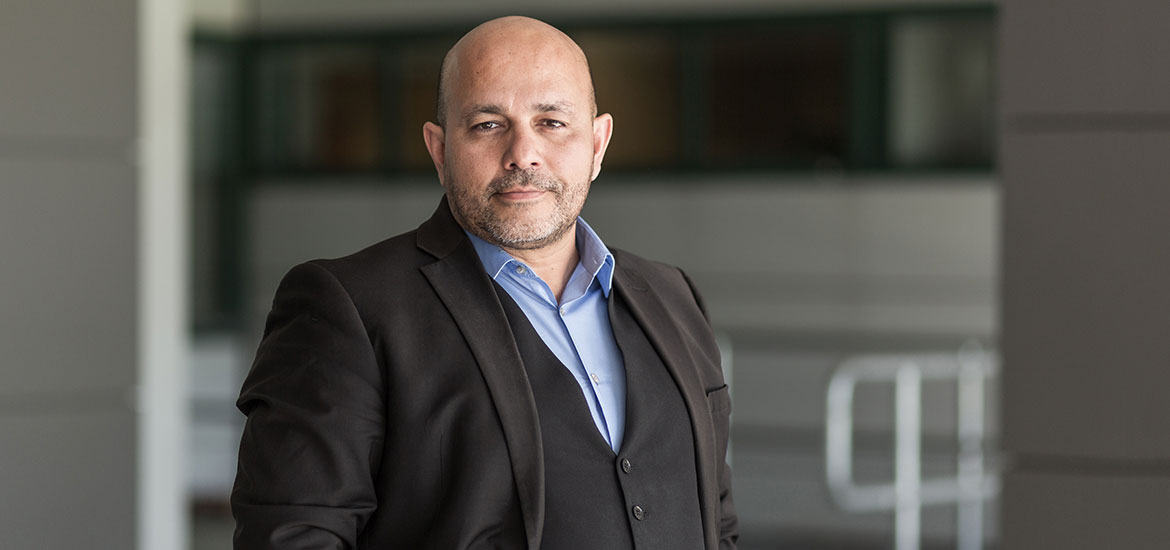
Distinguished computational scientist and informatics expert Alfredo Tirado-Ramos, PhD, has joined the Dartmouth community to lead biomedical and translational informatics programs for the Geisel School of Medicine and the Dartmouth-Hitchcock (D-H) health system.
Tirado-Ramos’ multifaceted leadership responsibilities will include serving as director of biomedical informatics at SYNERGY Clinical and Translational Science Institute—Dartmouth’s CTSA (Clinical and Translational Science Award), funded by the National Institutes of Health. Tirado-Ramos will also serve as director of the Biomedical Data Science Research Software Laboratory and associate professor in the Department of Biomedical Data Science at Geisel, and scientific director of biomedical informatics for D-H.
“We are delighted to have Alfredo aboard—being able to secure someone of his experience and expertise is a major coup for Dartmouth,” says Alan I. Green, MD, chair and professor of psychiatry at Geisel, and director of SYNERGY. “Informatics is a key part of modern clinical and translational research and an essential component of linking data from electronic health records with research questions. Alfredo’s impact will be dramatic in helping us use ‘big data’ in sophisticated ways to advance our efforts in research and patient care throughout our system and beyond.”
Tirado-Ramos was formerly the chief and founder of the Clinical Informatics Division of the University of Texas Health Science Center at San Antonio, where he led a full-spectrum biomedical informatics program that explored the intersection between informatics, translational science, and clinically relevant datacentric problems—including computable phenotype-based research in areas such as health disparities, obesity, ALS, aging, and cancer.
With substantial funding from PCORI (Patient-Centered Outcomes Research Institute) and the CTSA Program, he created an information research system for interdisciplinary collaboration between pediatric endocrinologists, cancer researchers and neurologists, while establishing new institutional governance frameworks. Tirado-Ramos also co-directed the informatics core at the San Antonio Claude D. Pepper Older Americans Independence Center—as part of a National Institute on Aging award—where he developed state-of-the-art informatics tools to investigate treatments for age-related diseases, with a major focus on pharmacological interventions.
“I am excited to join the Dartmouth community; I feel very welcomed and strongly supported,” says Tirado-Ramos. “I was drawn to Dartmouth by the opportunity to work with Dr. Alan Green, who through the SYNERGY program has been working to advance translational science and clinical care, and also by the challenge of bridging the discoveries made by Dartmouth’s world-class researchers and the clinical domain of its health system.”
“We’re very pleased to have Alfredo here to fill this key position for our institution,” says Michael Whitfield, PhD, interim chair of the Department of Biomedical Data Science and professor of molecular and systems biology and biomedical science at Geisel. “He brings a real depth of experience in clinical and biomedical informatics to Dartmouth, and he will play a pivotal role in creating a research environment that will allow us to interface better with Dartmouth-Hitchcock from the basic research side, so we can begin to analyze clinical data in more depth to improve patient care and outcomes.”
Tirado-Ramos foresees advancing biomedical and translational informatics at Dartmouth in two phases. “In the next year, we’ll be focused on bringing the SYNERGY program up to speed in terms of establishing the infrastructure and resources we need to ensure that our CTSA is refunded and we can continue to build on the great work that has been done here to date,” he says. “Then within five years, I’d like to see Dartmouth connect with national and international networks and become one of the lead centers for biomedical and translational informatics.”
“Alfredo has hit the ground running, helping us to start a strategic plan for deployment of tools that can allow collaborative sharing of data from multiple institutions’ health records,” says D-H Chief Health Information Officer Peter Solberg, MD. “And he brings a great personal charm and energy to the crucial role of coordinating College and D-H efforts.”
Prior to joining the University of Texas, Tirado-Ramos served as associate director for the Biomedical Informatics Core at the Center for AIDS Research at Emory University’s Rollins School of Public Health. His work at Emory focused on informatics applied to clinically relevant biomedical challenges, including the correlations between infectious disease and cancer and whole genome sequencing for vaccine development research.
While at Emory University, Tirado-Ramos was also a scientific member of the Winship Cancer Institute Prevention and Control Program, as well as a senior member of the research staff at the Center for Comprehensive Informatics.
After earning a BSc in electrical and electronics engineering at the Universidad Autonóma de Nuevo León (Mexico) in 1995, Tirado-Ramos received an MSc in electrical engineering from the University of Arizona in 1998. He completed his PhD in computational science at the Universiteit van Amsterdam (The Netherlands) in 2007.
****
Founded in 1797, the GEISEL SCHOOL OF MEDICINE AT DARTMOUTH strives to improve the lives of the communities it serves through excellence in learning, discovery, and healing. The Geisel School of Medicine is renowned for its leadership in medical education, health care policy and delivery science, biomedical research, global health, and in creating innovations that improve lives worldwide. As one of America’s leading medical schools, Dartmouth’s Geisel School of Medicine is committed to training new generations of diverse leaders who will help solve our most vexing challenges in health care.
DARTMOUTH-HITCHCOCK (D-H) is a nonprofit academic health system serving communities in northern New England. D-H provides access to more than 1,000 primary care doctors and specialists in almost every area of medicine at Dartmouth-Hitchcock Medical Center; the Norris Cotton Cancer Center, the Children’s Hospital at Dartmouth-Hitchcock, four affiliate hospitals, 24 ambulatory clinics and through the Visiting Nurse and Hospice for VT and NH. The D-H system trains nearly 400 residents and fellows annually, and performs world-class research, in partnership with the Geisel School of Medicine at Dartmouthand the White River Junction VA Medical Center.